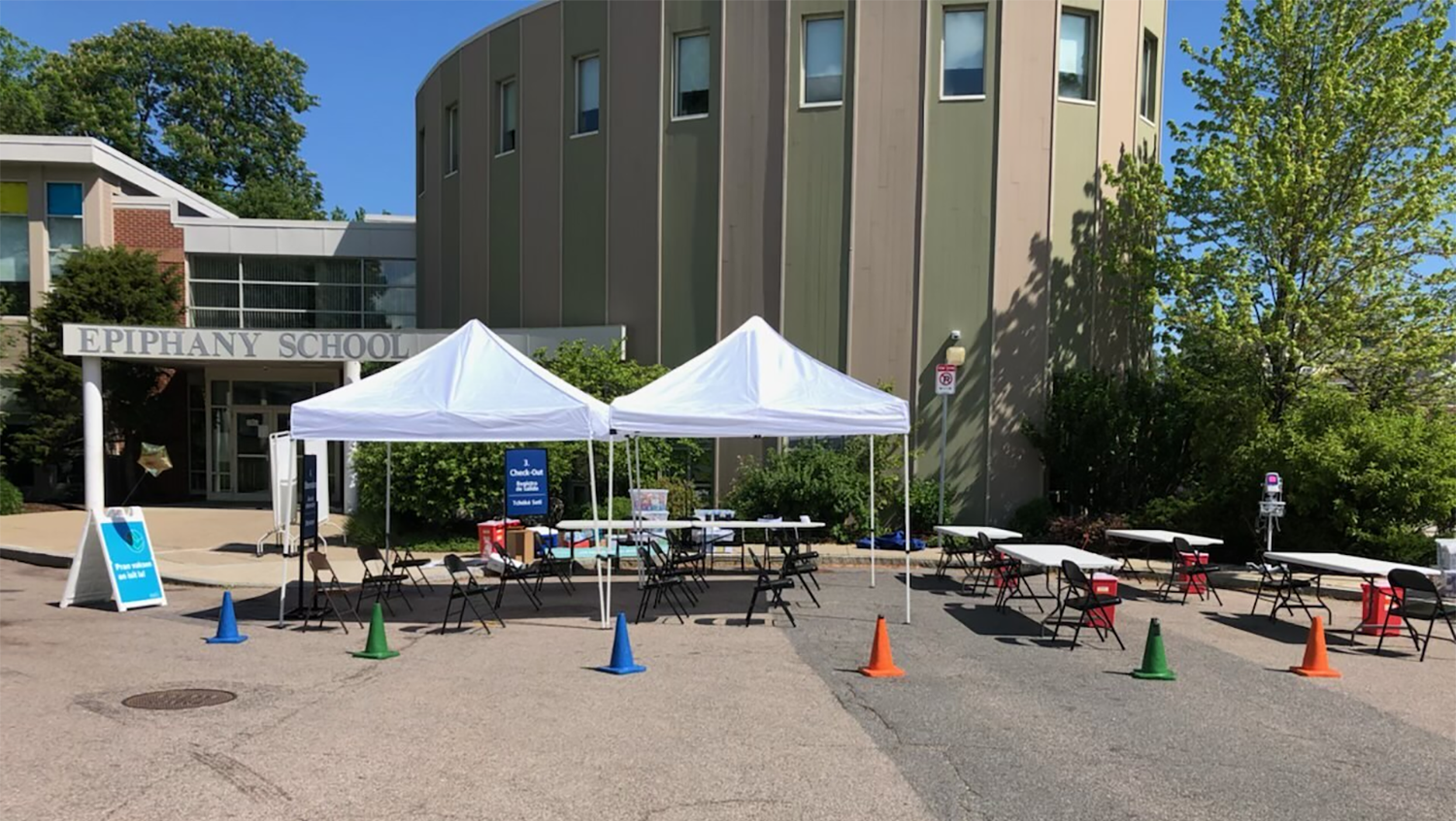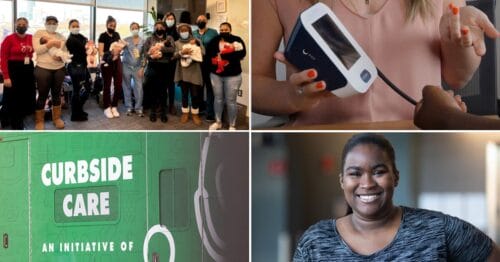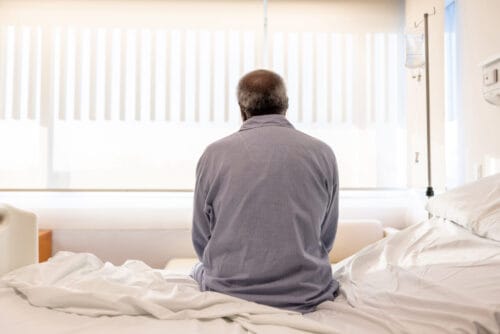BMC Joins a New NIH Alliance to Address Root Causes of COVID-19 Inequities
June 28, 2021
By Leslie Doyle

Nancy Hanright
By hearing stories of people in underserved neighborhoods, researchers hope to understand and help overcome longstanding barriers to healthcare access.
While there are positive signs the COVID-19 pandemic is waning in Massachusetts, the effects will be long-lasting—particularly in communities of color, which had significantly higher infection and hospitalization rates. Black Americans who contract COVID-19 have a death rate that’s twice that of white Americans.
In March 2021, Boston Medical Center (BMC) opened COVID-19 vaccination sites in Dorchester, Mattapan, Hyde Park, Roslindale, the South End, and later Roxbury, in collaboration with community-based partners, including the Thomas M. Menino YMCA, Morning Star Baptist Church, and affiliated community health centers across Boston. However, now, in July, the hospital and communities in Boston are facing the obstacles of reaching those who haven’t yet been vaccinated and connecting them to those clinics and others.
A research team at BMC is working to understand how best to serve those communities that have been hardest hit by the pandemic. By meeting people who live across underserved neighborhoods to hear their stories, researchers are hoping to not only improve confidence in vaccines and clinical trials, but to understand and help overcome longstanding barriers to healthcare access.
Neighborhood outreach key in COVID-19 vaccine dissemination
To increase COVID-19 vaccine access and foster trust, teams of multilingual nurses and community health workers with strong community ties have been going door-to-to-door to reach neighbors who face obstacles, such as limited mobility. In addition, teams have been visiting local shops and community centers to ask people if they’re interested in the vaccine.
“There has been a lot of great dialogue started this way,” says BMC director of operations for COVID-19 vaccines Alicia Peterson, MBA.
One common concern they’ve found in the community is worries about immigration status, and so teams are working to disseminate the information that the COVID-19 vaccine is free and requires no documentation or health insurance.
BMC applies these insights to continually find new ways to increase vaccine acceptance.
“The source of much of our innovation and iteration comes from the on-the-ground experience of our mobile engagement team and input from our community-based partners,” says Peterson.
One hallmark event was a field day led by students from Charlestown High School, who teamed up with BMC to motivate classmates to get vaccinated. Associate chief pharmacy officer Sebastian Hamilton, BSP, RPh, MBA, PharmD, met one-on-one with the students to help them understand and improve vaccine confidence. Hamilton and others worked to dispel common myths about the vaccine on social media and help students and family members find accurate sources of information.

The day before the event, the students joined BMC nurses fluent in English, Spanish, and Haitian Creole to canvas the neighborhood to initiate community conversations and ease anxieties about the vaccine.
BMC Joins NIH Community Engagement Alliance Against COVID-19 Disparities
Thanks to a grant from the National Institutes of Health (NIH) Community Engagement Alliance (CEAL) Against COVID-19 Disparities, BMC is building on this existing work with its partners. BMC experts hope to use innovative strategies to understand barriers to COVID-19 prevention and treatment as a means to both increase vaccine uptake and to drive more inclusive participation in clinical trials. The multifaceted study strives to:
- Connect with people who have been most severely impacted by the COVID-19 pandemic
- Provide trustworthy information through active community engagement
- Improve diversity and inclusion in the research response to COVID-19
“COVID-19 arrived and ripped apart the fabric, exposing unequal access to healthcare that has always existed,” says Benjamin Linas, MD, TRUST Study lead investigator and BMC infectious disease physician. “As a member of CEAL, we’re now able to be part of a national conversation addressing the root causes of these inequities.”
BMC is among 27 peer institutions working to strengthen the national response to the pandemic by focusing on local outreach. The study will be focus on both qualitative and quantitative research and applying evidence-based interventions.
“We’re exploring how to be more inclusive in science—and how to begin to make right on the history of distrust and structural racism,” says Linas.
Members of the research team have begun meeting people door to door to ask them about their healthcare concerns, which Linas believes will be much more impactful than interacting through a newsletter or website for information.
“It’s all a journey and people are in different places when it comes to vaccines,” says Petrina Martin Cherry, MBA, BMC’s vice president of Community Engagement & External Affairs. “It’s one thing to show up in the community and set up sites, but by showing up and listening, we can better understand how to make people more comfortable with getting the vaccine.”
Beyond increasing vaccine acceptance, the research team is striving to improve healthcare by increasing diversity in clinical trials. The historic exploitation of Black Americans by the medical research establishment has made it an uphill battle to achieve diversity.
“Medications are being approved for the general population that are based on data from a tiny sliver of the population,” says Linas. “That is not generalizable science. If you don’t have all the players at the table when asking research questions, you can’t possibly be generating the right hypotheses.”
To increase clinical trial participation, the Massachusetts CEAL team is conducting a rapid assessment phase of focus groups and patient interviews to discover what messages resonate best to drive vaccine and clinical trial confidence. This will be followed by polling to uncover people’s attitudes toward science and clinical trials.
“Listening is a major part of our research,” says Stephanie Lorfils, MHCH, community engagement recruitment specialist in Clinical Research Network at BMC. “We’re engaging directly with the community and really listening so we can better understand attitudes and behaviors around COVID-19 and around research in general.”
Building the infrastructure to better serve the community
Although the short-term goal is to increase vaccine and clinical trial participation, researchers hope that the study and other BMC efforts are setting up the template for how to better communicate with community members moving beyond the pandemic.
“In the long run, we’re seeking to build an infrastructure so that people across the community can share the issues and concerns they want us to focus on,” says Sabrina Assoumou, MD, MPH, infectious disease physician at BMC. “For us, success means building a trusting relationship with the community so that they can be partners in generating the important questions we should be answering through research. This increases our chances of having them participate if we create something they care about.”
Even beyond Boston, CEAL Teams are working across the country, gathering polling data and sharing best practices for community engagement. These materials will become NIH instruments that future research teams can apply.
“It’s not enough for us to help the 10,000 people in the area we serve,” says Linas. “We have the opportunity to help hundreds of thousands of people by studying BMC’s remarkable efforts throughout this pandemic and disseminating the lessons we learn to our colleagues all around the U.S.”


